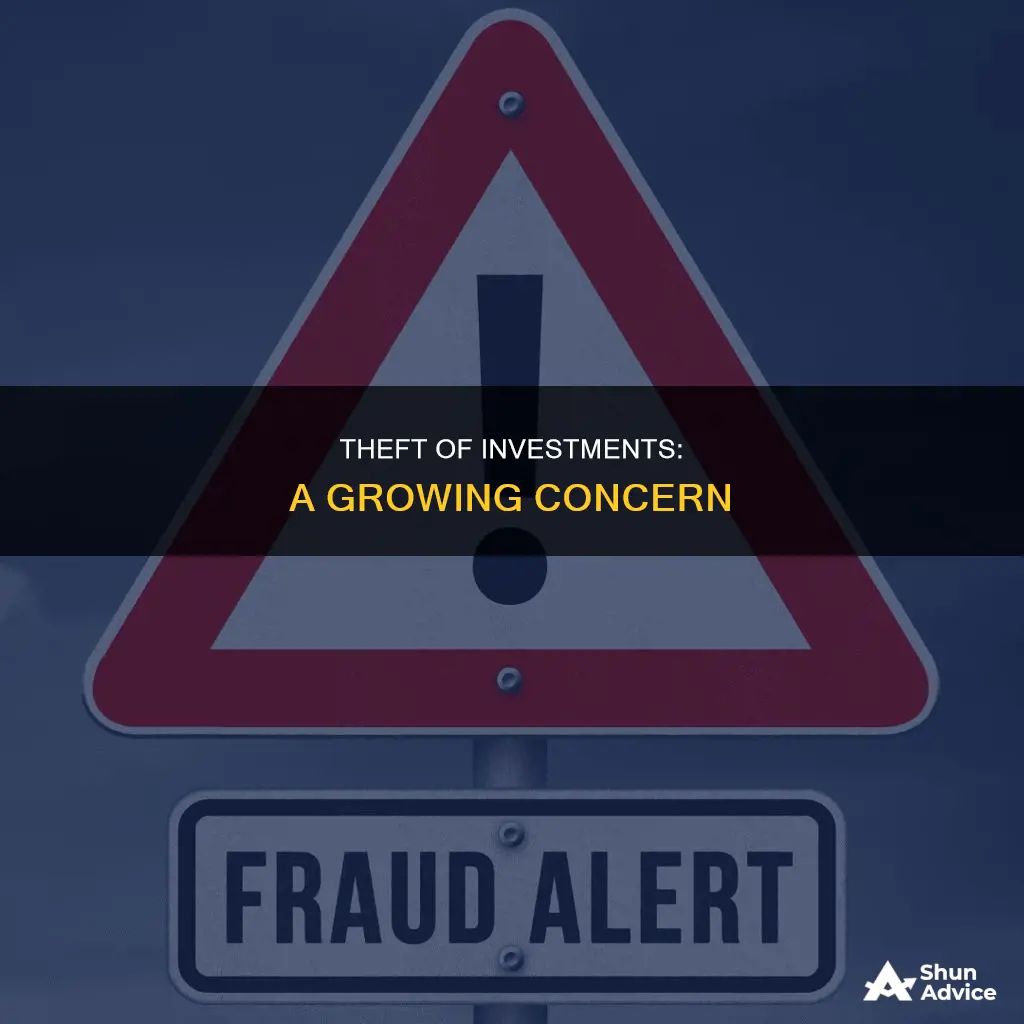
Investment theft is a very real threat, and one that has become increasingly common in recent years. While it's not always as simple as someone stealing your money, there are many ways in which people can steal investments or commit investment fraud. From identity theft to Ponzi schemes, broker embezzlement, and pump-and-dump schemes, there are many ways that bad actors can take advantage of investors.
It's important to be vigilant and aware of the potential risks involved when investing. Due diligence is key when selecting a broker or financial advisor, and it's crucial to monitor investments regularly for any irregularities or unexplained losses. While it's important not to let the fear of fraud prevent individuals from investing, it's also vital to be informed and take steps to protect oneself from financial fraud.
| Characteristics | Values |
|---|---|
| How do people steal investments? | Theft and forgery, unauthorised trading, misappropriation of funds, Ponzi schemes |
| Who steals investments? | Stockbrokers, brokers, financial advisors, investment advisors, executors of deceased estates |
| Why do people steal investments? | Desperation, gambling debts, drug habits, unaffordable lifestyles, greed, addiction |
| How to protect yourself | Research brokers, understand fee structures, regularly review account statements, be vigilant, practice due diligence, monitor accounts, communicate regularly with brokers |

Identity theft
- Be vigilant about your personal information: Treat your personal information as confidential. Be cautious about sharing personal details such as your Social Security number, financial account numbers, phone number, email address, and passwords or passphrases for online financial accounts.
- Monitor your accounts regularly: Regularly review your account balances and activities, looking for any unauthorized access or suspicious activity. Report any issues immediately to your investment firm and document all communications in writing.
- Use strong passwords and two-step verification: Create strong, unique passwords or passphrases for your online accounts, and change them regularly. Consider enabling two-step verification, which requires both a password and a unique code sent to your device to log in.
- Be cautious about phishing attempts: Avoid clicking links or attachments in emails, texts, or pop-up messages. Instead, access your financial accounts by directly typing the legitimate URL into your browser or using the official app.
- Protect your devices: Use up-to-date security software and keep your operating systems and browsers updated. Avoid using public Wi-Fi or unfamiliar hotspots for financial transactions.
- Freeze your credit report: Consider freezing your credit report to prevent new creditors from accessing your credit file. This can help stop identity thieves from opening new accounts in your name.
- Monitor your credit reports: Regularly review your credit reports for any signs of fraud, such as unknown accounts, credit checks, or unfamiliar personal information.
- Create an Identity Theft Report: If you become a victim of identity theft, create an Identity Theft Report to help deal with credit reporting companies, stop debt collection, and mitigate the damage caused by the breach.
- Work with reputable firms: Choose investment firms with strong security measures, such as multi-factor authentication, transaction alerts, and secure messaging systems.
- Be cautious about sharing login credentials: Avoid sharing your investment account login information with third-party aggregation websites and apps, as this may void your investment firm's protection policy in the event of a breach.
Investing in Others: A Worthy Bet
You may want to see also

Broker misconduct
- Breach of Fiduciary Duty: A fiduciary duty requires a person to act in the best interest of their client, putting the client's interests ahead of their own. Investment advisors owe a fiduciary duty to their clients, and stockbrokers may owe a fiduciary duty depending on the circumstances. If a broker prioritises their interests over their client's, they may be in breach of their fiduciary duty.
- Churning: Churning occurs when a broker engages in excessive trading in a client's account to generate commissions. This is a form of fraud, as the broker is prioritising their own financial gain over the client's interests.
- Failure to Supervise: Brokerage firms have a duty to supervise the activities of their brokers and ensure they are complying with relevant policies, procedures, and rules. If a firm fails to adequately supervise its brokers and misconduct occurs, the firm may be held liable.
- Misappropriation of Assets: This involves a broker using client funds for personal gain or to cover up losses. It is illegal for financial advisors to steal client money, and if this occurs, the client may have a misconduct claim against both the broker and the firm.
- Misrepresentations and Omissions: Federal and state securities laws prohibit brokers from making any "material misrepresentation" about investments they are selling. Brokers also have an obligation to disclose all information that a reasonable investor would want to know. Misrepresenting or failing to disclose material facts may make a broker liable for the customer's losses.
- Negligence: If a broker is negligent in their dealings with a customer, the customer may have recourse against them. Negligence refers to conduct that falls below the legal standard of care and puts clients at unreasonable risk.
- Lack of Diversification: A fundamental concept of investing is diversification, which helps to control risk. If a broker fails to diversify a client's account and concentrates their investments in a single product or type of investment, they may be liable for any resulting losses.
- Selling Away: This occurs when a broker solicits a client to purchase securities that are not offered by their brokerage firm. These outside investments are typically riskier and pay a higher commission to the broker. "Selling away" is a violation of FINRA rules and state and federal securities laws.
- Unauthorized Trading: Unauthorized trading happens when a broker executes transactions in a client's account without the client's permission. Unless the broker has been given discretion to make such trades, unauthorized trading constitutes a breach of the broker's fiduciary duty.
It's important to be aware of warning signs and red flags that may indicate broker misconduct. These can include an unusual number of trade confirmations, dramatic changes to your portfolio, pressure to act immediately on an investment, and a lack of communication or transparency. If you suspect any misconduct, it's crucial to seek legal advice and take appropriate action to protect your investments.
Investments: Where People Put Their Money
You may want to see also

Investment fraud
- Unauthorized Trading: Brokers may make trades without the client's consent, resulting in significant investment losses. They may mislead clients into believing they have permission or make trades outside established guidelines.
- Misappropriation of Funds: Brokers may use client funds for personal gain or to cover up losses. This can include transferring funds to shell companies or accounts they control.
- Ponzi Schemes: Brokers may use new investors' money to pay off earlier investors, creating a false sense of profitability. As more investors join and demand returns, the scheme becomes harder to sustain.
- Phishing and Malware: Criminals may use sophisticated tactics such as phishing emails or malware to gain access to investors' accounts and steal their funds.
- Identity Theft: With the increase in data breaches, identity thieves may target investment and retirement accounts, posing as customer service to gain access to sensitive information.
- Social Media and Online Scams: Fraudsters use social media and online platforms to connect with potential victims, luring them with promises of high returns and low risk. These scams often target educated individuals.
- Common Red Flags: Be wary of high-pressure sales tactics, promises of exorbitant profits, claims of no risk, evasive answers, withholding written information, and requests for personal financial information.
To protect yourself from investment fraud, it is crucial to research brokers and advisors thoroughly, understand their fee structures, and regularly review account statements for any irregularities. It is also important to work with reputable and licensed professionals and seek legal assistance if you suspect any fraudulent activities.
Value Investing: A Rare Gem
You may want to see also

Misappropriation of funds
In law, misappropriation may be defined as "the unauthorised, improper, or unlawful use of funds or other property for purposes other than that for which [they were] intended". It commonly refers to situations in which the offending party has an added measure of responsibility, such as misconduct by a public official, a trustee of a trust, or an administrator of a deceased person's estate.
- Embezzlement: The theft or exploitation of money entrusted to someone for safekeeping or management.
- Fraud: Deliberately deceiving others to gain access to funds.
- Insider trading: Obtaining confidential or non-public information to make unfairly advantageous trades on the stock market.
- Money laundering: Hiding profits from illegal activity by making them appear legitimate.
- Tax fraud: Deliberately providing false information to pay less tax.
- Director self-dealing: When a director uses company funds to repay a loan they have personally guaranteed.
In the UK, penalties for fund misappropriation can include criminal charges, fines, loss of employment, and damage to reputation. It is also a crime in the US, where it is often charged at the state level, although federal court can handle cases if federal funds have been misappropriated, the internet was used to carry out the crime, or state lines were crossed.
Why Education is a Worthy Investment
You may want to see also

Forgery
Brokers may also use forgery to misappropriate funds, as in the case of International Investment Group (IIG), which operated as a Ponzi scheme and used forged documents to hide their losses and sell investors fake loan assets. Forgery can also aid in unauthorized withdrawals, as seen in a case where a broker forged withdrawal slips for the accounts of elderly customers for their personal use.
To combat forgery, the Securities and Exchange Commission (SEC) and the Financial Industry Regulatory Authority (FINRA) have implemented rules such as FINRA Rule 4530, which requires brokers to report any allegations of theft or forgery. Criminal convictions involving forgery result in a "statutory disqualification", with certain misdemeanors, including forgery, disqualifying an individual from working as a stockbroker for 10 years.
Investors should thoroughly review their account statements and ensure that each transaction is authorized. If investors suspect that their stockbroker has forged their signature, they should contact a securities attorney immediately.
Small Investments, Big Returns
You may want to see also
Frequently asked questions
Stockbrokers can and do steal their clients' money, though it is not common. While brokers cannot legally steal your money, they can act unethically or illegally through unauthorized trading, excessive trading to generate commissions, or outright fraud.
Some signs that your broker may be stealing from you include unexplained losses, a lack of communication or transparency, and a refusal to provide information about their firm, investment strategy, or methodology.
To protect yourself from broker fraud, it is important to thoroughly research brokers before selecting one, understand their fee structure, and regularly review your account statements for any unauthorized transactions. You should also be vigilant and exercise due diligence in monitoring your accounts.
If you suspect your broker is stealing from you, you should immediately report any suspicious activity to the appropriate authorities and consider speaking with an investment fraud attorney.







